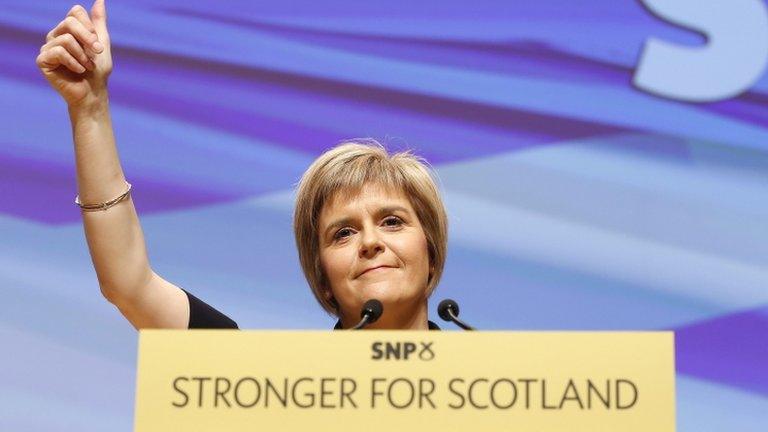New Scottish First Minister Nicola Sturgeon makes gender equality pledge
- Published
Nicola Sturgeon is elected as the new first minister of Scotland after winning more MSPs' votes in a contest with Ruth Davidson
The newly elected first minister of Scotland, Nicola Sturgeon, has pledged to deliver greater opportunities for women.
Ms Sturgeon, the first female to hold the post, also vowed to tackle low pay and improve childcare.
The politician, who succeeded Alex Salmond, said she had "big boots" to fill but would "wear them in my own way".
She promised to represent all people in Scotland, regardless of their politics.
Ms Sturgeon, who took over as SNP leader from Mr Salmond at the weekend, told parliament: "My pledge today to every citizen of our country is simple but it is heartfelt - I will be first minister for all of Scotland, regardless of your politics or your point of view.
"My job is to serve you and I promise that I will do so to the very best of my ability."
Describing herself as a "working class girl from Ayrshire", she added: "I hope that my election as first minister does indeed help to open the gate to greater opportunity for all women.
"I hope that it sends a strong, positive message to girls and young women, indeed to all women, across our land - there should be no limit to your ambition for what you can achieve.
"If you are good enough and if you work hard enough, the sky is the limit and no glass ceiling should ever stop you from achieving your dreams."
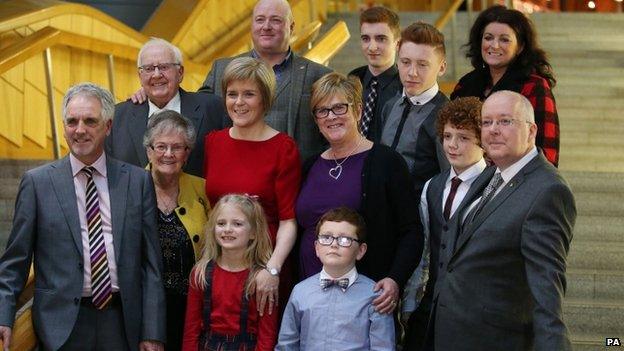
Nicola Sturgeon and her family, including niece Harriet, posed for pictures at parliament
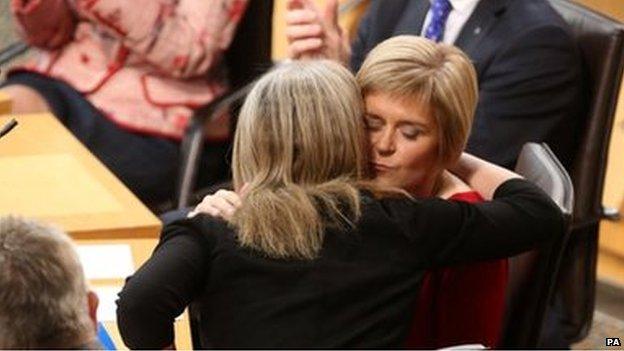
Nicola Sturgeon was congratulated by fellow MSP Shona Robison in the Holyrood chamber
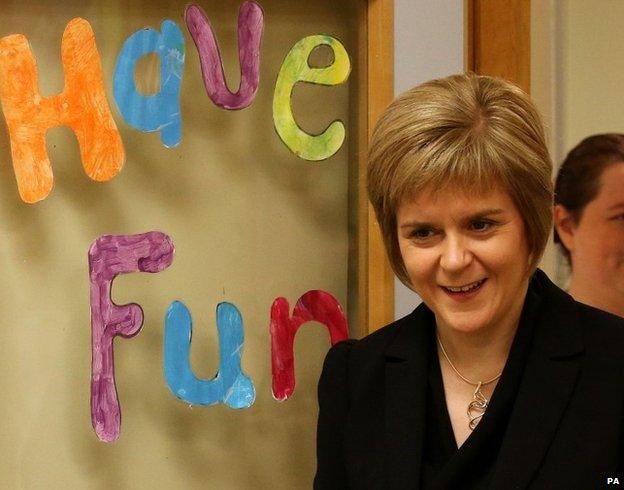
Sturgeon visited the Royal Hospital for Sick Children in Edinburgh earlier in the day
As her eight-year-old niece, Harriet Owens, watched from the parliament's public gallery, Ms Sturgeon told MSPs: "She doesn't yet know about the gender pay gap , or underrepresentation, or the barriers like high childcare costs that make it so hard for so many women to work and pursue careers.
"My fervent hope is that she never will, that by the time she is a young woman she will have no need to know about any of these issues because they will have been consigned to history."
Ms Sturgeon added: "If, during my tenure as first minister, I can play a part in making that so for my niece and for every other little girl in this country, I will be very, very happy indeed."
Ms Sturgeon also said she would continue to argue the case for independence, but would also do her best with Scotland's devolved powers to tackle poverty, boost business and the economy, and tackle inequality.

ANALYSIS
By Brian Taylor, BBC Scotland political editor
In office as first minister, Nicola Sturgeon will not be short of advice.
From the civil service, from her colleagues, from the public, from her friends and family. She noted that she would be happy to draw on the well of expertise that is her predecessor, Alex Salmond.
But she was offered one more source of inspiration today.
Ruth Davidson - who contested the post in Holyrood - suggested that Ms Sturgeon might draw upon the career of another powerful woman who led a government. Margaret Hilda Thatcher.
Ms Sturgeon declined to adopt this particular role model. But she did have another Tory in mind.
One Florence Horsbrugh, the former Scottish Unionist member for Dundee who was the first woman to respond to the Kings Speech in the Commons.
Ms Sturgeon drily recalled the bold Florence had astutely discounted the potential reaction to her speech in advance by noting that, as the first female to undertake the task, she was guaranteed a place in history, whatever she said.
Both politicians, I feel certain, were deploying the skill of self-deprecation. Certainly, Ms Sturgeon voiced the hope that she might earn a fraction more in the way of public and political approbation.

"There is a burning desire across our country to build a more prosperous, fairer and better Scotland," she said.
"People didn't just vote yes for a better country - I know that those who voted no want a better country too."Ms Sturgeon was voted in as first minister in parliament after a contest against Scottish Conservative leader Ruth Davidson, who put her name forward as a "Unionist alternative".
However, the SNP's parliamentary majority helped ensure Ms Sturgeon got the job as Scotland's fifth first minister by 66 votes to 15, with 39 abstentions.
Ms Davidson said she hoped the "politics of division" would come to an end in the wake of the sometimes heated referendum campaign.
"We can still disagree and, knowing the new first minister, we both know that, to coin a phrase, the ricks will melt in the sun before that stops," she said.
"But I hope that we can do so with mutual respect and with a mutual acknowledgement that we are all -Conservative, Liberal, Labour and SNP - seeking to make Scotland a better place."
MSP Jackie Baillie, speaking for the Scottish Labour Party, congratulated Ms Sturgeon, adding: "The fact that we have three out of five party responses today being delivered by women is, I hope, a recognition of how far we have travelled in recent years in the differing nature of this parliament from other places."
Willie Rennie, the Scottish Liberal Democrat leader, said: "This is a wonderful day for equality. As the first minister of Scotland, Nicola Sturgeon has been elevated to a special select group of powerful women in the world."

The women-only club
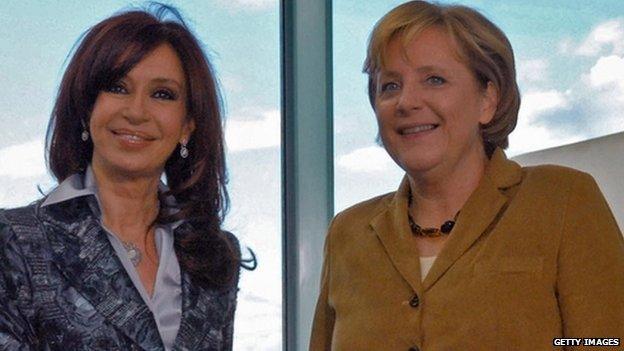
Argentina's Cristina Fernandez de Kirchner and Germany's Angela Merkel are women leaders
Nicola Sturgeon is set to become the 20th member of the worldwide club of women leaders. At 44, she'll be one of the youngest in its ranks.
So, how else does Ms Sturgeon - the Irvine-born former solicitor - compare with other's in this exclusive set?
Some took roles which were once occupied by their husbands or fathers
Four of them have been given the "Iron Lady" label - made famous by Britain's first woman prime minister Margaret Thatcher
Two were paediatricians before entering into full-time politics
One faced an alleged assassination plot
And another was sent to exile

Green co-leader Patrick Harvie said Ms Sturgeon was a "highly capable, professional and impressive" political figure.
On Thursday, Ms Sturgeon will be formally sworn into the role before Scotland's judges in the Court of Session in Edinburgh, before taking part in her first session of first minister's questions in her new job.
She is also expected to appoint a deputy first minister, possibly as part of a wider reshuffle of the Scottish government's ministerial team, later in the week.
Mr Salmond, who stood down as first minister and SNP leader in the wake of the "No" vote in September's Scottish independence referendum, is staying on as the MSP for Abderdeenshire East.
However, the former MP is also considering standing for Westminster in the 2015 UK election.
- Published19 November 2014
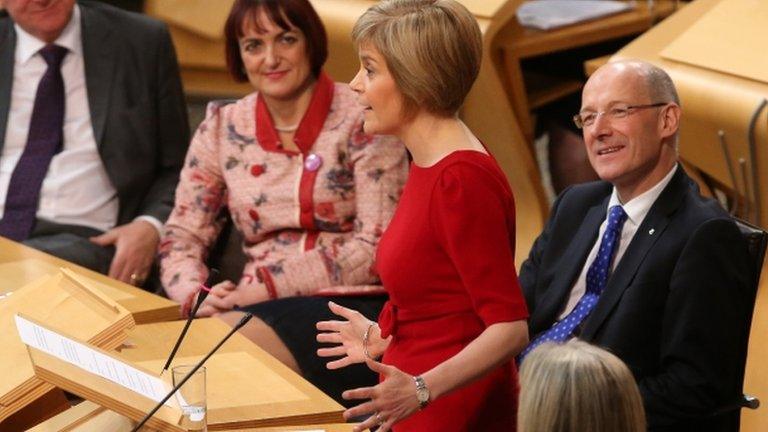
- Published26 May 2017
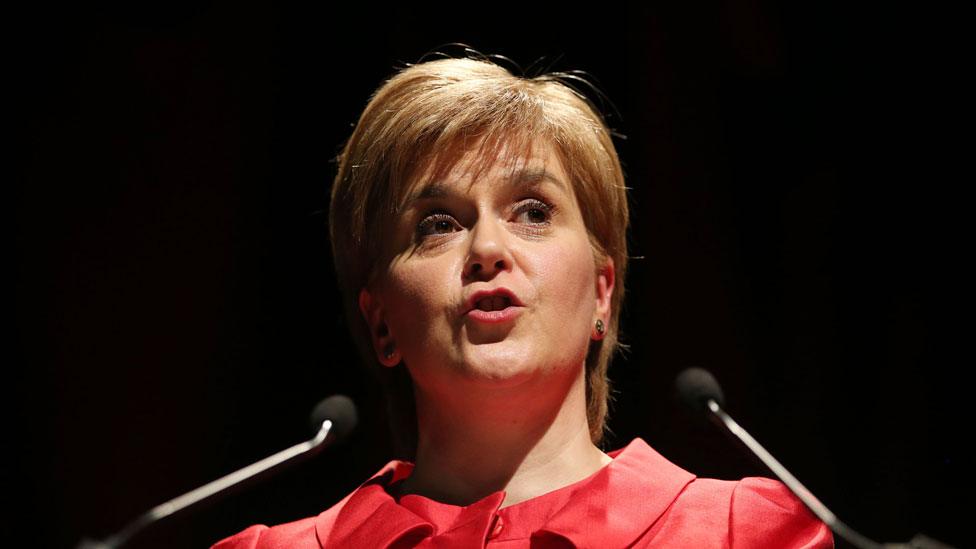
- Published19 November 2014
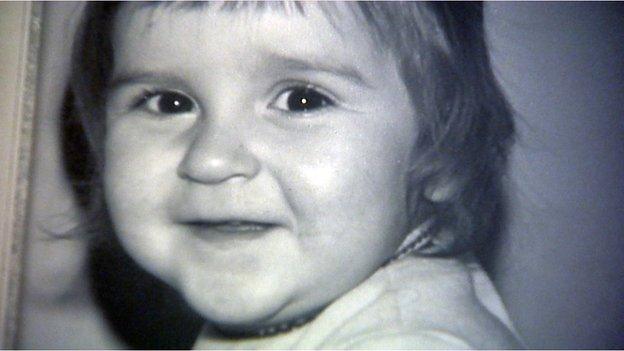
- Published19 November 2014
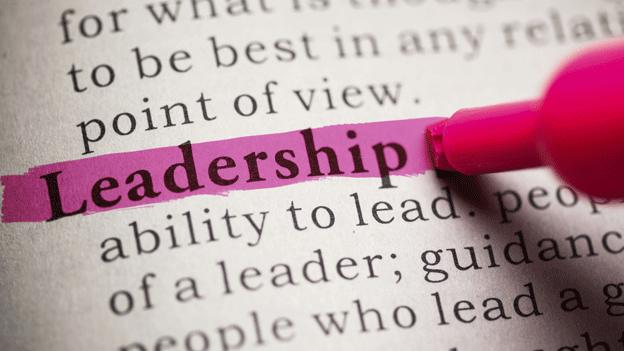
- Published18 November 2014
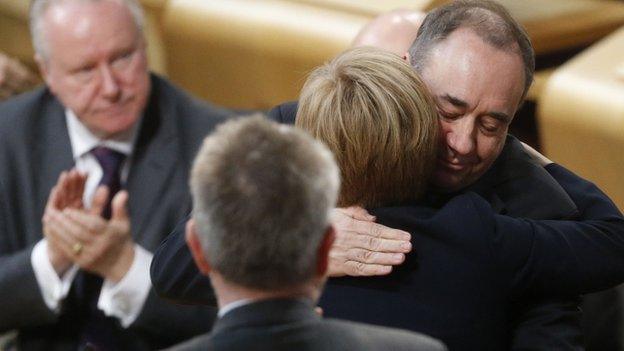
- Published14 November 2014
